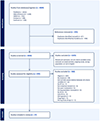Interpersonal trauma, shame, and substance use: A systematic review
- PMID: 38552599
- PMCID: PMC11090047
- DOI: 10.1016/j.drugalcdep.2024.111253
Interpersonal trauma, shame, and substance use: A systematic review
Abstract
Background: Interpersonal trauma is a risk factor for a wide array of adverse mental health outcomes, including substance use. Research has begun investigating the role of shame in the intersection between substance use and interpersonal trauma. The current systematic review summarizes the existing literature documenting the relation among shame, substance use, and interpersonal trauma.
Method: Articles were collected using a Boolean search strategy of terms related to interpersonal trauma, substance use, and shame across six databases. Independent search and screening by three researchers led to a final review of 27 articles, 15 of which were qualitative studies.
Results: Findings highlight robust associations among shame, interpersonal violence, and substance use across varied samples. Findings emphasize that increased shame is associated with greater substance use among survivors of interpersonal violence and elevated shame and greater interpersonal violence are present among individuals who use substances given the high prevalence rates. Burgeoning research suggests that shame mediates the relationship between interpersonal violence and substance use.
Conclusion: Results from our review suggest that shame may be an important treatment target for individuals presenting with substance use and a history of interpersonal violence. Future studies, with longitudinal designs, are needed to parse out the temporal relation among shame, substance use, and interpersonal violence.
Keywords: Alcohol; Drug; Interpersonal violence; Physical assault; Racism; Sexual assault; Shame.
Copyright © 2024 Elsevier B.V. All rights reserved.
Conflict of interest statement
Declaration of Competing Interest No conflict declared.
References
-
- Ahrens CE, Rios-Mandel LC, Isas L, & del Carmen Lopez M (2010). Talking about interpersonal violence: Cultural influences on Latinas’ identification and disclosure of sexual assault and intimate partner violence. Psychological Trauma: Theory, Research, Practice, and Policy, 2(4), 284–295. 10.1037/a0018605 - DOI
-
- American Psychiatric Association. (2013). Diagnostic and statistical manual of mental disorders (5th ed.). Arlington, VA: American Psychiatric Publishing
Publication types
MeSH terms
Grants and funding
LinkOut - more resources
Full Text Sources
Medical


